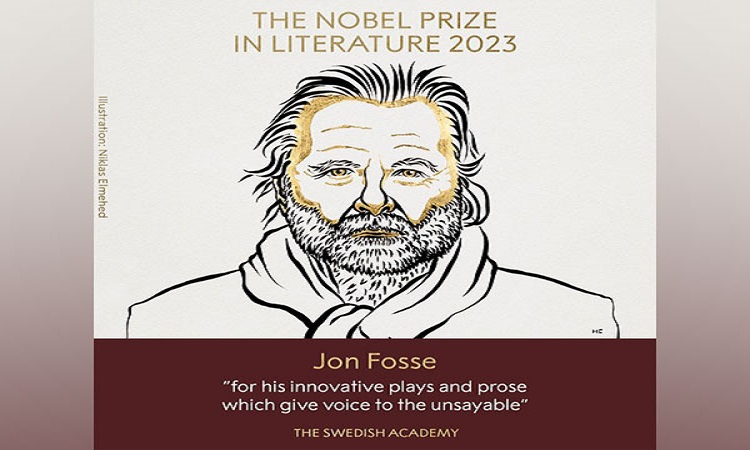Nobel Literature 2023 awarded to Norwegian Jon Fosse, author says "overwhelmed, grateful"
The Nobel Prize in Literature 2023 has been awarded to Norwegian author Jon Fosse "for his innovative plays and prose which give voice to the unsayable", the Royal Swedish Academy announced in Stockholm on Thursday. Read further on Dynamite News:

Stockholm [Sweden]: The Nobel Prize in Literature 2023 has been awarded to Norwegian author Jon Fosse "for his innovative plays and prose which give voice to the unsayable", the Royal Swedish Academy announced in Stockholm on Thursday.
The 64-year-old author and dramatist had according to the Academy produced works spanning a variety of genres including plays, novels, poetry collections, essays, children's books and translations.
Fosse receives 11 million Swedish krona, about USD 991,000.
"I am overwhelmed and grateful," he said in a news release issued by his Norwegian publisher after the accolade according to the New York Times.
"I see this as an award to the literature that first and foremost aims to be literature, without other considerations," the US daily newspaper reported.
This year's literature laureate Jon Fosse writes novels heavily pared down to a style that has come to be known as 'Fosse minimalism', according to Nobel Prize Twitter.
Also Read |
Sports: Neeraj Chopra claims silver medal at Diamond League, breaks own national record
This can be seen in his second novel 'Stengd gitar' (1985), when Fosse presents us with a harrowing variation on one of his major themes, the critical moment of irresolution. A young mother leaves her flat to throw rubbish down the chute but locks herself out, with her baby still inside. Needing to go and seek help, she is unable to do so since she cannot abandon her child. While she finds herself, in Kafkaesque terms, 'before the law', the difference is clear: Fosse presents everyday situations that are instantly recognisable from our own lives, according to the Nobel Prize Twitter.
While he is today one of the most widely performed playwrights in the world, he has also become increasingly recognised for his prose, the Swedish Academy described the author born in 1959 in Haugesund in Norway's west coast.
Fosse writes in Norwegian Nynorsk, one of the two official written standards of the Norwegian language, the other being Bokmal.
According to his publisher, since his 1983 fiction debut, Fosse has written prose, poetry, essays, short stories, children's books, and over 40 plays, with more than a thousand productions performed and translations into 50 languages.
Fosse, according to the official Twitter feed of The Nobel Prize has much in common with his great precursor in Norwegian Nynorsk literature Tarjei Vesaas.
The author, it said, combines strong local ties, both linguistic and geographic, with modernist artistic techniques. He includes in his Wahlverwandschaften such names as Samuel Beckett, Thomas Bernhard and Georg Trakl.
Also Read |
Nobel Prize in Economics goes to Paul R. Milgrom, Robert B. Wilson
"While Fosse shares the negative outlook of his predecessors, his particular gnostic vision cannot be said to result in a nihilistic contempt of the world. Indeed, there is great warmth and humour in his work, and a naive vulnerability to his stark images of human experience," it said.
Fosse's breakthrough as a dramatist came with the 1999 production of his play 'Nokon kjem til a komme' (1996; 'Someone Is Going to Come', 2002). With its themes of fearful anticipation and crippling jealousy, Fosse's singularity is fully evident, it said.
The author in a 2022 interview with the New Yorker had stated, "When I'm writing well, I have this very clear and distinct feeling that what I'm writing on is already written."
After making his name as a novelist, with the "Red, Black" in 1983, the author's "A New Name: Septology VI-VII," the last in a seven-novel sequence, explores an older man's reckoning with God, and was a finalist for the 2022 National Book Awards.
The Nobel Prize in Literature 2022 was bestowed upon Annie Ernaux, for her "courage and clinical acuity with which she uncovers the roots, estrangements and collective restraints of personal memory."
Previous Nobel Laureates include Toni Morrison, Kazuo Ishiguro and Rabindranath Tagore. The youngest laureate was Rudyard Kipling, who was 41 years old when he was awarded in 1907. (ANI)
 Dynamite News
Dynamite News 